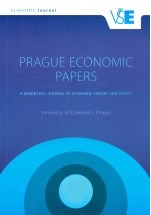Volatility Spillover Effect from Energy Markets to Foreign Exchange Markets: The Case of Central and Eastern European and Eurasian Countries
Volatility Spillover Effect from Energy Markets to Foreign Exchange Markets: The Case of Central and Eastern European and Eurasian Countries
Author(s): Dejan Živkov, Boris Kuzman, Nataša Papić-BlagojevićSubject(s): Economy, Energy and Environmental Studies, Environmental and Energy policy, International relations/trade, Political economy, Financial Markets, Transport / Logistics
Published by: Vysoká škola ekonomická v Praze
Keywords: Risk spillover; energy markets; exchange rate; CGARCH; quantile regression
Summary/Abstract: This paper investigates the nonlinear risk transmission from the oil and natural gas marketsto the foreign exchange markets of five energy importers and one major energy exporter. Weseparate conditional volatility into the transitory (short-term) and permanent (long-term) parts,and then these volatilities are embedded in an elaborate robust linear quantile regression model.We find that the risk spillover effect is relatively low in Central and Eastern European countries(CEECs) probably because they pursue a managed float exchange rate regime. On the otherhand, this effect is higher for Turkey and Russia, which is especially true for the effect from oilto the rouble at the highest quantile. This happens because Russia receives the largest amountof foreign currency from oil exports. The results indicate that the short-term risk spillover effectis notably stronger than the long-term one, which means that the exchange rate volatility ismainly determined by market sentiment. The rolling regression results coincide very well withthe estimated quantile parameters.
Journal: Prague Economic Papers
- Issue Year: 33/2024
- Issue No: 4
- Page Range: 478-503
- Page Count: 26
- Language: English

